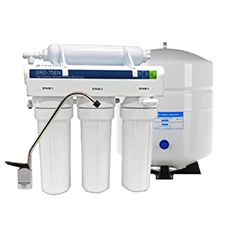Reverse Osmosis vs. Refrigerator Filters: Which is Best?
Reverse Osmosis vs. Refrigerator Filters: Which One Is the Best?
When it comes to improving the quality of your drinking water, many Cleveland homeowners choose either a refrigerator water filter or reverse osmosis water filter. Reverse osmosis systems are the better option because, although they’re more expensive to install, they provide purer, better tasting water and have similar maintenance.
We’ll compare reverse osmosis and refrigerator filters in terms of:
- Filtration process (and contaminants removed)
- Regular maintenance
- Cost
Want purer, better tasting drinking water? Call Global, at (216) 797-1230 to schedule a free in-home water test.
Our plumbers will answer any questions you have about refrigerator and reverse osmosis water filtration systems. They’ll also go over our reverse osmosis systems, which have a 4-stage filtration process that helps eliminate contaminants to give you cleaner, clearer water to drink and cook with.

Reverse osmosis filter solutions (RO water filters) are a convenient and economical way to improve the taste and purity of your drinking water.
Filtration Process
Refrigerator water filtration process
Many refrigerators today have built-in water dispensers that include a filter to remove contaminants. Refrigerator water filters use single-stage activated carbon filters to remove contaminants. Carbon filters use a process called adsorption, where contaminants adhere to the filter when the water passes through it.
The average refrigerator filter is designed to remove:
- Lead and some other metals
- Chlorine and chlorine byproducts (like trihalomethanes)
- Volatile organic compounds (VOCs)
Most refrigerator water filters can reduce the presence of, but don’t completely remove:
- Dissolved substances (minerals, salts, and metals like iron)
- Some viruses and bacteria
- Arsenic
- Per- and polyfluoroalkyl substances (PFAS)
You can upgrade to an advanced refrigerator filter that removes more contaminants than basic filters, but you’ll still be limited to a single-stage system that only filters water once.
Reverse osmosis water filters have more filtration steps, which means they’re more effective at removing contaminants from your water.
Maintenance
Refrigerator filter maintenance
Maintenance on refrigerator water filters is relatively low effort. You’ll need to replace the carbon filter every 6 months. If you let the filter run longer than that, you risk contaminants getting into your drinking water.
However, keep in mind that water filtration systems are one more feature of a refrigerator that can break down. This means refrigerators with water filters typically require more repairs, and you could pay up to a couple hundred dollars for each repair.
Reverse osmosis maintenance
Reverse osmosis water filters also require regular replacements. You’ll need to replace the:
- Sediment filter every 18-24 months
- Two carbon filters every 6-12 months
- Reverse osmosis filter every 2-3 years
How often you need to replace the filters will depend on the water contamination level and how often you use the system.
Between the replacement filters and higher upfront installation cost, reverse osmosis systems will cost more than a refrigerator water filter.
Cost
Refrigerator water filter cost
Since refrigerator water filters come built into your refrigerator, you’re not technically paying an installation cost. That said, refrigerators with water filters are usually several hundred dollars more than refrigerators without water filtration.
You can also expect to pay between $40 and $100 a year in filter replacements for refrigerator water filters.
Reverse osmosis cost
The cost of a reverse osmosis system can range anywhere from $200 to over $7,500, depending on whether you choose a point-of-use or whole-house reverse osmosis system and depending on its effectiveness.
A point-of-use reverse osmosis system will cost between $200 to $1,500. Your reverse osmosis installation cost will increase if you choose:
- An under-the-sink model, as opposed to a countertop system. Countertop models can run $100-$400, while the more convenient under-sink systems can cost between $300 and $1,500.
- A tankless system over a tank one. Tankless reverse osmosis systems are more convenient, since you don’t have to wait for a tank to fill up and essentially have an endless supply of fresh, pure drinking water—but that convenience will cost you several hundred dollars more.
- Advanced filtration. Some reverse osmosis water filters remove more contaminants than others. More advanced filters will cost you more—in both the upfront installation and filter replacement costs.
After installation, you can expect to pay between $50 and $100 a year in maintenance and operation costs for a reverse osmosis system.
If you don’t want to foot the upfront cost of a new reverse osmosis system, but still want the purest drinking water for your family, Global offers reverse osmosis systems for only $29.99/month.
Want Better Water With Reverse Osmosis? Call Global.
Call us today at (216) 797-1230 or schedule an appointment for a free in-home estimate.
We’ve been offering the Global heating and cooling service in the greater Cleveland area for 17 years and counting. Our skilled technicians will explain the benefits of reverse osmosis systems over refrigerator filters and how to get the healthiest, best-tasting water in your home.




